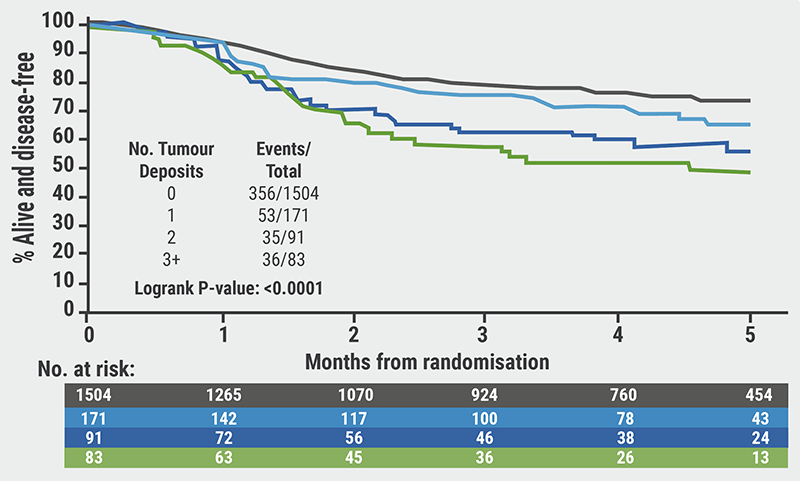https://doi.org/10.55788/bf4f53c1
In patients with resectable pancreatic cancer, complete resection and effective systemic therapy achieve the best outcomes. Upfront surgery followed by adjuvant chemotherapy, preferably mFOLFIRINOX, is the current standard-of-care. However, neoadjuvant treatment may offer early control of systemic disease, improved delivery of chemotherapy, and/or improved surgical outcomes (R0 and N0 resection rates). The aim of the phase 2, unblinded NorPACT-1 trial (NCT02919787) was to test the efficacy of neoadjuvant mFOLFIRINOX treatment for resectable pancreatic head cancer. Prof. Knut Labori (Oslo University Hospital, Norway) presented the results [1].
The study randomised 140 participants with resectable pancreatic head cancer to upfront surgery followed by 12 cycles of mFOLFIRINOX or 4 cycles of mFOLFIRINOX followed by surgery and 8 additional cycles of mFOLFIRINOX. The primary endpoint was the OS rate 18 months after randomisation (in the intention-to-treat [ITT] population). In the neoadjuvant arm, 77% of participants underwent resection compared with 89% in the upfront surgery arm; 66% of participants in the neoadjuvant arm started adjuvant chemotherapy compared with 75% in the upfront surgery arm.
Neoadjuvant treatment did not improve OS in the ITT population. At 18 months, 60% of participants were alive in the neoadjuvant arm versus 73% in the upfront surgery arm (P=0.1). The median OS per protocol was 23.0 versus 34.4 months, respectively.
On the other hand, neoadjuvant mFOLFIRINOX did improve histological outcomes. R0 (per protocol) was 59% in the neoadjuvant arm versus 33% in the upfront surgery arm (P=0.011); N0 was 37% versus 10% (P=0.002). Neoadjuvant mFOLFIRINOX also resulted in more grade 3–4 adverse events compared with adjuvant mFOLFIRINOX (55.6% versus 40%).
Prof. Labori concluded that while there was an improvement in histological outcomes with neoadjuvant mFOLFIRINOX, this improvement was not translated into better survival. “These results do not support neoadjuvant mFOLFIRINOX as a standard-of-care in resectable pancreatic cancer. However, additional follow-up may better elucidate the long-term effects of the improvement in R0 and N0 rates in the neoadjuvant arm.”
- Labori KJ, et al. Short-course neoadjuvant FOLFIRINOX versus upfront surgery for resectable pancreatic head cancer. A multicenter randomized phase-2 trial (NORPACT-1). Abstract LBA4005, ASCO Annual Meeting 2023, 2–6 June, Chicago, USA.
Copyright ©2023 Medicom Medical Publishers
Posted on
Previous Article
« AI detects gastric cancer with high accuracy in common blood tests Next Article
Adding chemotherapy to EGFR TKI does not improve OS in advanced EGFR-mutated NSCLC »
« AI detects gastric cancer with high accuracy in common blood tests Next Article
Adding chemotherapy to EGFR TKI does not improve OS in advanced EGFR-mutated NSCLC »
Table of Contents: ASCO 2023
Featured articles
Real-world data support new SOC in patients with SCLC
What can real-world evidence teach us about atezolizumab plus bevacizumab in HCC?
Colorectal Cancer
7-year outcomes of PRODIGE 23 trial
Neoadjuvant chemotherapy may be viable option in locally advanced colon cancer
De-escalation of neoadjuvant treatment of locally advanced rectal cancer is non-inferior
Breast Cancer
SONIA: No survival benefit with first-line versus second-line CDK4/6 inhibition in metastatic breast cancer
Adjuvant ribociclib improves invasive DFS in early breast cancer
Gene expression profiles predict benefit of neoadjuvant immune checkpoint therapy in triple-negative breast cancer
Lung Cancer
Adding pembrolizumab to perioperative chemotherapy improves EFS in early-stage NSCLC
TTFields therapy: a new treatment modality for metastatic NSCLC
Adding chemotherapy to EGFR TKI does not improve OS in advanced EGFR-mutated NSCLC
Upper GI Cancer
No improved OS in pancreatic cancer after neoadjuvant mFOLFIRINOX
AI detects gastric cancer with high accuracy in common blood tests
Melanoma
Response-directed treatment personalisation in stage III melanoma
Prognostic and predictive biomarkers in patients with resected stage IIB/C melanoma
GU Cancers
Combining PARP inhibition and androgen receptor-signalling inhibition improves radiographic progression-free survival in HRR-deficient mCRPC
Erdafitinib outperforms chemotherapy in FGFR-altered advanced urothelial cancer
Probiotic CBM588 seems to improve clinical effect cabozantinib/nivolumab in mRCC
Exploratory analysis of IMvigor130 trial finds no OS benefit from atezolizumab in subgroups
Miscellaneous
Immune checkpoint inhibition improves PFS in non-BRCA-mutated ovarian cancer
First-line nivolumab-AVD improves PFS both in adult and paediatric patients with advanced Hodgkin lymphoma
Vorasidenib successfully targets IDH1/2-mutated glioma
ASCO Interviews
IMbrave050: Adjuvant atezolizumab plus bevacizumab provides landmark recurrence-free survival for HCC
What can real-world evidence teach us about atezolizumab plus bevacizumab in HCC?
© 2024 Medicom Medical Publishers. All rights reserved. Terms and Conditions | Privacy Policy


